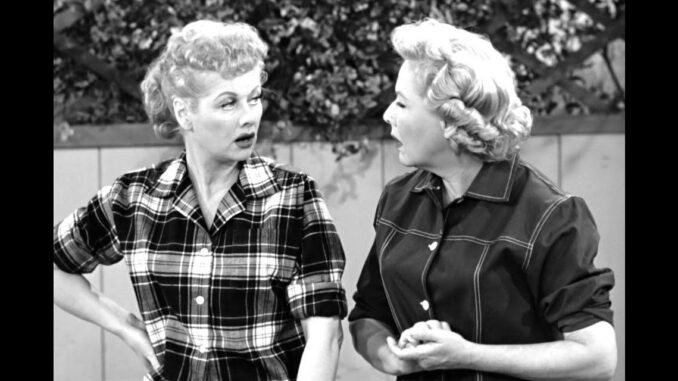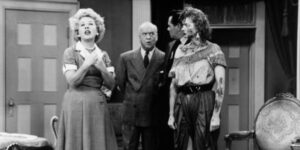
Introduction: A Friendship That Defined Television
When you think of iconic duos, Lucy Ricardo and Ethel Mertz from I Love Lucy instantly come to mind. Their comedic antics, heartfelt moments, and undeniable chemistry made them one of the most beloved pairs in television history. But behind the scenes, was their friendship as genuine as it appeared on-screen? Let’s dive deep into the fascinating dynamic between these two legendary characters and the actresses who brought them to life.
The On-Screen Magic of Lucy and Ethel
Why Lucy and Ethel Were the Heart of the Show
Lucy and Ethel were more than just neighbors; they were partners in crime. Whether scheming to make extra money or sneaking into Ricky’s club, their bond was the driving force behind many of the show’s funniest moments. Fans saw them as the ultimate friendship goals, but there was more to the story.
How Their Chemistry Captivated Audiences
Lucille Ball (Lucy) and Vivian Vance (Ethel) brought their characters to life with impeccable timing and relatable humor. Their interactions felt so natural that viewers believed they were best friends in real life. But was that really the case?
The Real-Life Relationship Between Lucille Ball and Vivian Vance
An Uneasy Start
When Vivian Vance was cast as Ethel, she initially had reservations. Playing the older, frumpier neighbor to Lucille Ball’s glamorous Lucy wasn’t exactly her dream role. Lucille, on the other hand, was skeptical about whether Vivian could handle the comedic demands of the role. This rocky start set the tone for their off-screen relationship.
A Friendship with Boundaries
Over time, Lucille and Vivian developed a professional camaraderie. They respected each other’s talents and worked together seamlessly on set. However, their friendship was not without its challenges. Vivian reportedly struggled with being cast as the “sidekick” and often felt overshadowed by Lucille’s star power.
Tensions Over Appearance
One of the biggest sources of tension was the contrast in their appearances. Lucille’s character was always glamorous, while Vivian’s Ethel was deliberately dressed down. This dynamic sometimes caused friction, as Vivian felt the disparity highlighted her in a less flattering light.
The Impact of Hollywood Pressures
The Role of Studio Politics
Hollywood in the 1950s was a competitive and image-conscious industry. The pressures to maintain a certain persona often spilled over into the personal lives of actors. Lucille and Vivian were no exception, as studio executives and producers sometimes stoked rivalries to keep the show dynamic.
How Fame Strained Their Relationship
As I Love Lucy became a massive success, the demands of fame took their toll. Lucille, as the star and co-producer, had significant control over the show, which sometimes created a power imbalance. Vivian, despite her crucial role, occasionally felt undervalued.

The Complexity of Female Friendships in Hollywood
Friendship or Frenemies?
Lucy and Ethel’s relationship mirrored many real-life friendships, complete with ups and downs. They supported each other through thick and thin but also had moments of jealousy and frustration. It’s a reminder that even the strongest bonds aren’t perfect.
Breaking Stereotypes on Screen
Despite their differences, Lucy and Ethel broke new ground for female friendships on television. They showed that women could be funny, flawed, and fiercely loyal, setting the stage for future sitcoms to explore similar dynamics.
What Made Their On-Screen Friendship So Believable?
The Power of Comedy
Comedy was the glue that held Lucy and Ethel together. Their shared schemes and hilarious misadventures created a bond that transcended their personal differences. This comedic partnership resonated deeply with audiences.
Relatability to Everyday Viewers
Lucy and Ethel’s friendship wasn’t perfect, and that’s what made it relatable. They argued, made up, and supported each other in ways that mirrored real-life relationships.
Legacy of Lucy and Ethel’s Friendship
How They Redefined Female Roles on TV
Before I Love Lucy, female characters were often relegated to secondary roles. Lucy and Ethel changed that by taking center stage and proving that women could carry a show with humor and heart.
Influence on Modern TV Duos
From Friends to Broad City, the impact of Lucy and Ethel’s dynamic can be seen in countless TV shows. They set the standard for what a comedic duo could achieve.
Conclusion: A Friendship for the Ages
While Lucille Ball and Vivian Vance’s off-screen relationship may not have been as close as Lucy and Ethel’s on-screen bond, their partnership created television magic that endures to this day. Their dynamic showcased the complexities of friendship, both real and fictional, and left a legacy that continues to inspire.
FAQs
1. Were Lucille Ball and Vivian Vance friends in real life?
Yes, but their friendship was more professional than personal. They respected each other’s talents but had their share of disagreements.
2. Why did Vivian Vance feel overshadowed by Lucille Ball?
Vivian often felt overshadowed due to her role as the less glamorous sidekick, a dynamic reinforced by the show’s scripts and costumes.
3. Did Lucille Ball and Vivian Vance ever reconcile their differences?
Despite occasional tensions, they maintained a working relationship and mutual respect throughout their careers.
4. How did Lucy and Ethel influence modern TV friendships?
Their dynamic paved the way for female-centric comedies and showcased the importance of complex, relatable friendships on screen.
5. What made Lucy and Ethel’s friendship so iconic?
Their hilarious antics, heartfelt moments, and relatability made them a timeless duo that continues to resonate with audiences.